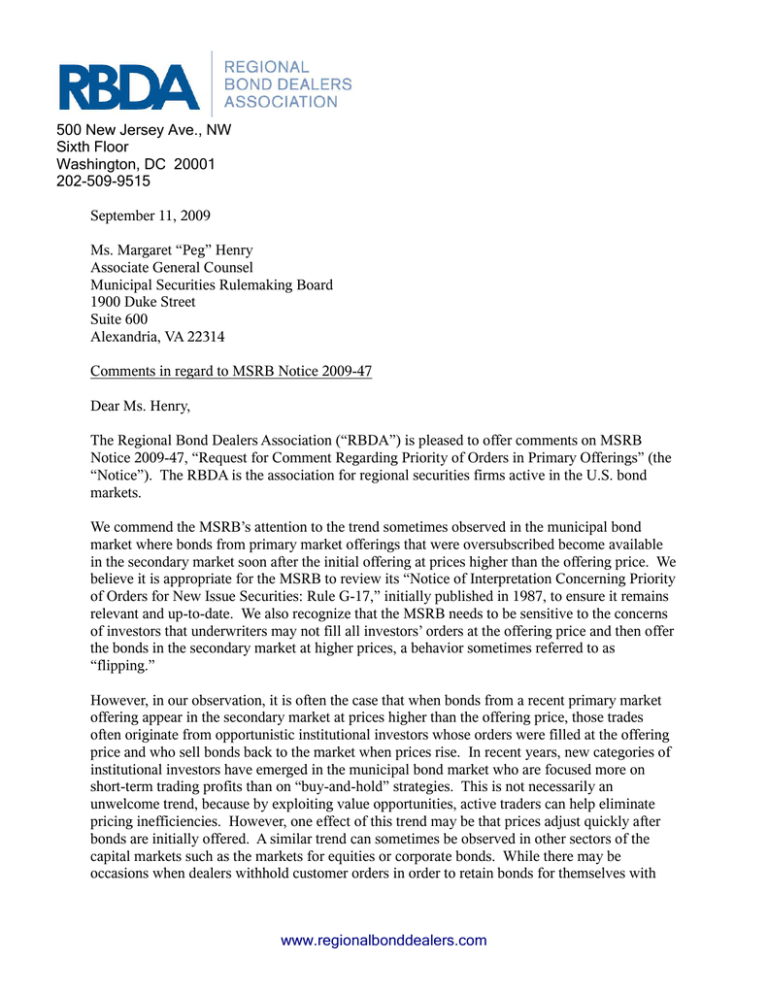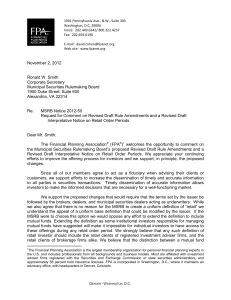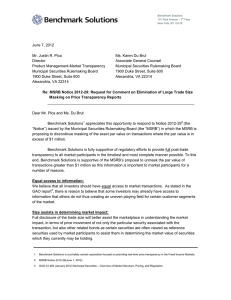500 New Jersey Ave., NW Sixth Floor Washington, DC 20001
advertisement

500 New Jersey Ave., NW Sixth Floor Washington, DC 20001 202-509-9515 September 11, 2009 Ms. Margaret “Peg” Henry Associate General Counsel Municipal Securities Rulemaking Board 1900 Duke Street Suite 600 Alexandria, VA 22314 Comments in regard to MSRB Notice 2009-47 Dear Ms. Henry, The Regional Bond Dealers Association (“RBDA”) is pleased to offer comments on MSRB Notice 2009-47, “Request for Comment Regarding Priority of Orders in Primary Offerings” (the “Notice”). The RBDA is the association for regional securities firms active in the U.S. bond markets. We commend the MSRB’s attention to the trend sometimes observed in the municipal bond market where bonds from primary market offerings that were oversubscribed become available in the secondary market soon after the initial offering at prices higher than the offering price. We believe it is appropriate for the MSRB to review its “Notice of Interpretation Concerning Priority of Orders for New Issue Securities: Rule G-17,” initially published in 1987, to ensure it remains relevant and up-to-date. We also recognize that the MSRB needs to be sensitive to the concerns of investors that underwriters may not fill all investors’ orders at the offering price and then offer the bonds in the secondary market at higher prices, a behavior sometimes referred to as “flipping.” However, in our observation, it is often the case that when bonds from a recent primary market offering appear in the secondary market at prices higher than the offering price, those trades often originate from opportunistic institutional investors whose orders were filled at the offering price and who sell bonds back to the market when prices rise. In recent years, new categories of institutional investors have emerged in the municipal bond market who are focused more on short-term trading profits than on “buy-and-hold” strategies. This is not necessarily an unwelcome trend, because by exploiting value opportunities, active traders can help eliminate pricing inefficiencies. However, one effect of this trend may be that prices adjust quickly after bonds are initially offered. A similar trend can sometimes be observed in other sectors of the capital markets such as the markets for equities or corporate bonds. While there may be occasions when dealers withhold customer orders in order to retain bonds for themselves with www.regionalbonddealers.com the intention of “flipping” them in the secondary market, we believe most flipping activity arises from investor accounts, sometimes even those who are traditionally buy-and-hold investors. Among other amendments, the MSRB’s draft rule changes in the Release would specify that “unless otherwise agreed to with the issuer,” new issue underwriting syndicates “shall give priority to customer orders over orders by members of the syndicate for their own account, orders from affiliates for their own account, or orders for their respective related accounts.” Syndicate managers would need to maintain records of allocations that diverged from this prioritization and reasons why. The Release would also establish a similar regime for secondary market trading accounts. For purposes of this provision, an “affiliate” would mean “a person controlling, controlled by, or under common control with a syndicate member or, when no syndicate has been formed, a sole underwriter.” A “related account” would mean “a related portfolio, municipal securities investment portfolio, or arbitrage account of a syndicate member or an affiliate, a municipal securities investment trust sponsored by a syndicate member or an affiliate, or an accumulation account established in connection with such a municipal securities investment trust.” The Release also contains a draft “Notice of Interpretation Concerning Priority of Orders for Securities in a Primary Offering: Rule G-17” (the “Notice”). The draft Notice states, among other points, that compliance with MSRB Rule G-17 dictates that underwriters must honor commitments to an issuer regarding the distribution of the issuer’s securities. The Notice states that an underwriter’s failure “to accept, give priority to, or allocate to retail orders in conformance with the provisions agreed to in an undertaking to provide a retail order period” without the issuer’s consent could be a violation of Rule G-17. The proposed rule changes in the Release are designed in part to address circumstances where underwriters fail to fill customer orders for securities in order to buy securities for their own account. The Notice is designed to address, in part, circumstances where underwriters submit retail orders during a retail order period when securities are actually intended to be bought for their own accounts or distributed to institutional customers. While the RBDA supports the intent of both the draft rule changes and the draft Notice contained in the Release, we question whether these proposals will be successful in preventing circumstances where secondary market prices of newly issued securities rise shortly after the initial offering. First, as we stated, we believe that in many cases, secondary market trades at prices above the offering price of an issue are often initiated by sales of securities by institutional investors, not by dealers’ selling from their own accounts. Clarifying that dealers must fill the orders of investor customers before retaining securities in their own accounts will not prevent those investors from selling securities at higher prices after the initial offering. Second, we believe that a dealer submitting retail orders during a retail order period when that dealer has no bona fide orders from retail customers is already a violation of Rule G-17 and can be addressed through strict enforcement of existing rules and interpretations. Rule G-17 states that dealers “shall not engage in any deceptive, dishonest, or unfair practice.” We believe that the act of submitting retail orders when none exists is already prohibited under that standard. 2 Moreover, the line between retail and institutional orders can sometimes be difficult to distinguish. This is especially true for orders that come from bank trust departments or third party asset managers who are submitting orders on behalf of their customers. It is not appropriate or possible for dealers to determine in all cases whether the orders submitted by asset managers as retail orders are truly for the benefit of retail customers. With regard to the definition of “affiliate” and “related account,” we are concerned that the proposed definition is too broad and would capture investor accounts that may be sufficiently independent to warrant treatment similar to unaffiliated customers. We are also concerned that the proposed definition of affiliate and related account would capture such a large volume of municipal market investors that market liquidity could be severely hampered, since orders from affiliates and related accounts could not be filled until all other customer orders were filled. The MSRB may want to consider alternative definitions of “affiliate” and “related account” for the purposes of the proposed order prioritization provisions of Rule G-11 and the related books and records requirements of Rules G-8 and G-9. One approach the MSRB may want to consider would use definitions from Rule G-14 and related interpretations. Under this approach, if an order from an account is required to be reported to the MSRB’s Real-Time Transaction Reporting System (“RTRS”) without any special condition indicator—as described in the MSRB’s “Specifications for Real-time Reporting of Municipal Securities Transactions” and other interpretations related to the RTRS—that investor would not be considered to be an affiliate or a related account. This approach may be useful because it provides a basis for identifying “arm’s-length transactions”1 that presumably take place at legitimate market prices. Thank you for the opportunity to present our views on the Notice. Please do not hesitate to call if you have any questions. Sincerely, /s/ /s/ Michael Decker Co-Chief Executive Officer Mike Nicholas Co-Chief Executive Officer 1 As referred to, for example, in Municipal Securities Rulemaking Board, “Reporting of Transactions in Certain Special Trading Situations: Rule G-14,” January 2, 2008. 3

